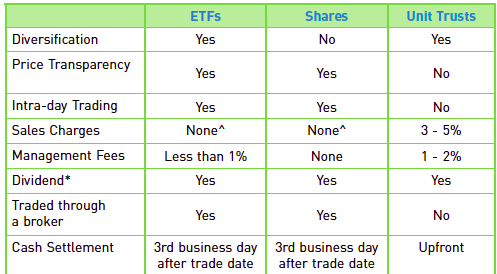Unit trust (or mutual fund) is one of the investment tools that’s familiar. It’s easy and a fund manager manages your investment. You simply leave it to the fund manager and you work on your business or your job. Hoping that the unit trust will grow in value in the long term. But, did you know that most unit trust does not do well?
Read on…
Investing is one of the important vehicles you need to build your wealth. Investing is more for the mid to long term—that is two years or more.
Exchange-Traded Funds (ETF) and Unit Trusts are two of the products many people use for investing. ETFs are open-ended investment funds listed and traded on a stock exchange. They aim to track, replicate or correspond to the performance of an underlying index or asset.
ETFs provide access to a wide variety of markets as well as asset classes and similar to trading any stock, you may buy or sell ETFs through your stock broker or through your own online trading account. ETFs are actually very similar to Unit Trusts. The only major difference is that there are no performance fees with ETFs.
Investors therefore pay lower management fees compared to hefty fees paid to fund managers when buying Unit Trusts. When you buy a Unit Trust, you need to pay the fund manager a management fee regardless of whether you are winning money or not.
This fund manager is the one who manages your account and money. As professionals, we trust that they can make better buy or sell judgments than us and eventually provide us with sound advice, with the aim of making more money for us compared to doing the investing ourselves.
If you do not mind the hefty fees and are clueless about the market, Unit Trusts may be one of the products you want to consider.
Investing my money into ETFs is my preferred choice due to its very low management fees and other advantage. Buying ETFs largely depends on the components of the particular ETF you buy, rather than the skill of a Fund Manager.
This is the main reason why fees for Fund Managers are much lower. On top of that, due to how ETFs are structured, you can achieve diversification of an index fund through a single investment.
Fact: Do you know according to statistics, close to 70% of ETFs beat Unit Trusts in terms of returns?
One of the key reasons is due to the very low management fees involved when buying ETFs, as compared to high management fees paid to Unit Trusts Fund Managers. Nevertheless, sales agents still push for Unit Trusts as it offers them higher commissions as compared to buying ETFs, which is mostly done through an online platform.
ETFs Vs Shares Vs Unit Trusts
If you like to find out how to have consistent winning trade using ETF as platform, you may like to join my training. Click below to find out more.












